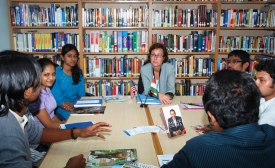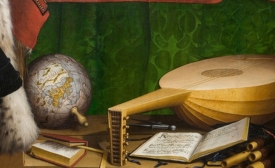american
Moshe Arens, a renowned Israeli politician and aeronautical engineer, received a Lifetime Achievement Award for his impact on Israel through diplomacy and dedicated public diplomacy efforts on behalf of the country.

The Office of American Spaces under the U.S. Department of State has recently released its annual report. With over 700 spaces across 169 countries, American Spaces "serve as the primary places of ongoing people-to-people connections between the United States and foreign audiences that are essential to advancing U.S. foreign policy objectives." Hosted in embassies, schools, libraries, and other partner institutions, often outside capital cities, these locales aim to further a core tenet of democracy: access to information.
When talking about cultural differences, there’s often a fear of saying the wrong thing or perpetuating stereotypes, and Liu’s graphics lighten up the discussion. What began as a visual diary is now meant as a playful guide for people who find themselves lost in translation.
Americans are gung-ho for Pope Francis' U.S. visit — if they know he's coming. But most Americans (52 percent) and nearly a third of Catholics (31 percent) say they hadn't heard about the pope's September visit to Philadelphia, New York City and Washington, D.C., according to a new survey released Tuesday by the Public Religion Research Institute in partnership with Religion News Service.
In his State of the Union address, the President’s core message was that the US has emerged strong from the twin crises caused by the 2001 terrorist attacks and the 2008 global recession. And the challenge he posed to Congress on foreign policy is this. Do we want to continue to operate in crisis mode – being fearful, reactive, and prone to overuse military force in ways that exacerbate security problems and contradict basic values?

Music and Diplomacy from the Early Modern Era to the Present is a book edited by Rebekah Ahrendt, Mark Ferraguto, and Damien Mahiet which delves into the topic of music diplomacy by analyzing historical and contemporary cases. It explores how music (its concepts, practices, and institutions) shape the exercise of diplomacy, the pursuit of power, and the conduct of international relations.
That K-dramas have bolstered South Korea's cultural capital is quite established. In May 2013, Park was invited to Los Angeles to participate in the Leaders' Meeting for Creative Economy. The meeting brought together South Korean government and entrepreneurs to discuss Korea's economic growth on the world stage. Park was there to discuss how DramaFever and similar initiatives were helping to bolster South Korea's global influence.







